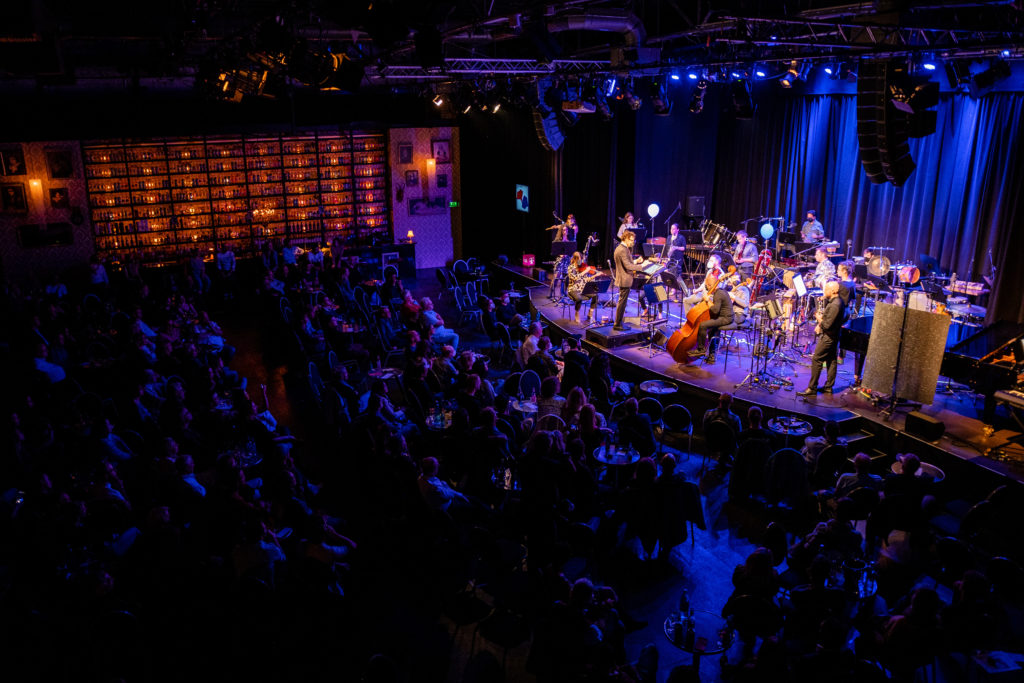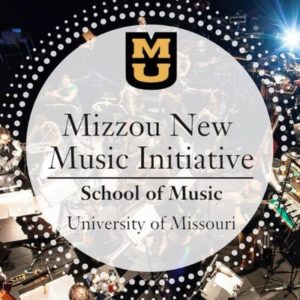

Keep in touch with AWS
Tuesday, January 17th, 7:00pm
Sinquefield Music Center
The University of Missouri
Columbia, MO
PROGRAM
Jlin arr. Santos, Back Against the Wall
Daniel Wohl, Artificial (world premiere)
JG Thirlwell, Execution (world premiere)
- Mvt. I: “Retribution”
- Mvt. II: “Evolution”
- Mvt. III: “Involution”
- Mvt. IV: “Devolution”
Chris P. Thompson arr. Brown, Hanabi (world premiere)
NOTES
Daniel Wohl, Artificial
In Artificial, I am taking a departure from my usual practice by composing a piece that can be experienced both as an electronic track and as an acoustic performance by the chamber orchestra, Alarm Will Sound. Written in 2021, this work investigates how electronic sounds can be translated for a traditional ensemble and how electronic music can be convincingly realized by human performers on instruments with a long history. The transcription process and the inherent qualities of the instruments have led to changes in the original composition, creating a new and unique interpretation of the work.
Artificial is a response to the ever-present and evolving role of technology in our lives. Rather than being overwhelmed or intimidated by it, I see technology as a tool that can be used to create something distinctly human. The electronic and acoustic elements in the piece represent the potential for technology to enhance and expand upon our innate artistic capabilities, rather than replacing them.
– Daniel Wohl
Chris P. Thompson arr. Brown, Hanabi
The original Hanabi was a short track on my EP Lot Hero from 2017, wherein I played with the similarities between quick, articulated samples of marching percussion instruments and the pops and sizzles of a fireworks show I had sampled. (Hanabi – 花火 means “fireworks” in Japanese).
This track was also the first time I ever incorporated the sound of a metronome into my music (a creative delight that has proven endlessly fruitful in my work to this day). I wanted to create a subtle transition: from the rigid structure of metronomic time to the chaotic entropy of fireworks.
After the record was out, I started working on a way to perform it live, which would involve me performing on a setup that included marching tenors. To open the show, I would play an extended version of Hanabi, where the backing tracks spun out the metronome sounds into different grooves, complimented by live drum kit and electric bass.
The live show I was developing never came to fruition, which is sad because I was excited by the idea of playing my music live with drummer and bassist friends. However, the extended, click-heavy version of Hanabi was interestingly different enough that I actually included it on my next album as Hanabi (in-ear extended mix). If Aphex Twin could remix himself I figured I could too.
Eventually, Hanabi (in-ear extended mix) entered the ears of one Miles Brown, and next thing I knew — here is a full arrangement for Alarm Will Sound, and I get to play my terrifying marching tenor parts live with my friends after all.
–Chris P. Thompson
Jlin arr. Santos, Back Against the Wall
“Alarm Will Sound thank you! Thank you for allowing me to be apart of such a great project! Collaborating with you all has been such a pleasure and learning experience that I will never forget. I’m very humbled you all selected me as one your collaborators.” –Jlin
My orchestration for JLIN’s Back Against the Wall was approached with a deliberate fidelity to the original track. In other words: the instrumental version attempts to capture the spirit of JLIN’s composition, and all of the colors and expression of its virtual instruments.
For example, the melodic lines are transcribed throughout as microtonal clusters (i.e. unison lines slightly “out of tune”), emphasizing the gritty nature of the original synthesizers, and many of the track’s “glitchy” effects are captured by extended instrumental techniques such as string overpressure, scraped percussion, etc.
The orchestration also delineates the form of the work by, for instance, shifting from a constant melodic tutti to a cello solo in the middle section—a change further emphasized by its change of tempo and meter.
I thoroughly enjoyed being part of this project—a lovely and rewarding collaboration!
– Igor Santos
Thirlwell, Execution
Acknowledgements
Alarm Will Sound gratefully acknowledges our individual donors and the following foundations for their support: Aaron Copland Fund for Music, Amphion Foundation, Alice M. Ditson Fund of Columbia University, BMI Foundation, Cheswatyr Foundation, Howard Gilman Foundation, New Music USA’s Organizational Development Fund in 2022-23, Mellon Foundation, and the Sinquefield Charitable Foundation.
Additional support provided by public funds from the New York City Department of Cultural Affairs in partnership with the City Council; the New York State Council on the Arts with the support of the Office of the Governor and the New York State Legislature; and the National Endowment for the Arts.
Alarm Will Sound
Alarm Will Sound is a 20-member band committed to innovative performances and recordings of today’s music. They have established a reputation for performing demanding music with energetic skill. Their performances have been described as “equal parts exuberance, nonchalance, and virtuosity” by the Financial Times of London and as “a triumph of ensemble playing” by the San Francisco Chronicle. The New York Times says that Alarm Will Sound is “one of the most vital and original ensembles on the American music scene.”
With classical skill and unlimited curiosity, Alarm Will Sound takes on music from a wide variety of styles. Its repertoire ranges from European to American works, from the arch-modernist to the pop-influenced. Alarm Will Sound has been associated since its inception with composers at the forefront of contemporary music, premiering pieces by John Adams, Steve Reich, David Lang, Mary Kouyoumdjian, Tyondai Braxton, Augusta Read Thomas, Derek Bermel, Meredith Monk, and Wolfgang Rihm, among others. The group itself includes many composer-performers, which allows for an unusual degree of insight into the creation and performance of new work.
Alarm Will Sound is the resident ensemble at the Mizzou International Composers Festival. Held each July at the University of Missouri in Columbia, the festival features eight world premieres by early-career composers. During the weeklong festival, these composers work closely with Alarm Will Sound and two established guest composers to perform and record their new work.
Alarm Will Sound may be heard on eighteen recordings, including including For George Lewis | Autoshchediasms, their most recent release featuring music of Tyshawn Sorey; Omnisphere, with jazz trio Medeski Martin & Wood; a collaboration with Peabody Award-winning podcast Meet the Composer titled Splitting Adams; and the premiere recording of Steve Reich’s Radio Rewrite. Their genre-bending, critically acclaimed Acoustica features live-performance arrangements of music by electronica guru Aphex Twin. This unique project taps the diverse talents within the group, from the many composers who made arrangements of the original tracks, to the experimental approaches developed by the performers.
Alarm Will Sound collaborates with artists who work beyond the bounds of classical music. Alarm System, the Matt Marks Impact Fund, and Video Chat Variations, a YouTube series developed during the COVID-19 pandemic, are initiatives that have created cross-genre music with electronica artists Eartheater, Jlin, King Britt, and Rashad Becker; jazz composer-performer Dave Douglas; multimedia artists Mira Calix, Bakudi Scream, and Damon Davis; soundtrack composers Brian Reitzell and JG Thirlwell; producer Valgeir Sigurðsson, and singer-songwriter Alyssa Pyper.
In 2016, Alarm Will Sound in a co-production with Opera Theatre of St. Louis, presented the world premiere of the staged version of Donnacha Dennehy’s The Hunger at the BAM Next Wave Festival and the Touhill Performing Arts Center. Featuring Iarla O’Lionárd (traditional Irish singer) and Katherine Manley (soprano) with direction by Tom Creed, The Hunger is punctuated by video commentary and profound early recordings of traditional Irish folk ballads mined from various archives including those of Alan Lomax.
In 2013-14, Alarm Will Sound served as artists-in-residence at The Metropolitan Museum of Art. During that season, the ensemble presented four large ensemble performances at the Met, including two site-specific productions staged in museum galleries (Twinned, a collaboration with Dance Heginbotham and I Was Here I Was I, a new theatrical work by Kate Soper and Nigel Maister), as well as several smaller events in collaboration with the Museum’s educational programs.
In 2011, at Carnegie Hall, the group presented 1969, a multimedia event that uses music, images, text, and staging to tell the compelling story of great musicians—John Lennon, Karlheinz Stockhausen, Paul McCartney, Luciano Berio, Yoko Ono, and Leonard Bernstein—striving for a new music and a new world amidst the turmoil of the late 1960s. 1969’s unconventional approach combining music, history, and ideas has been critically praised by the New York Times (“…a swirling, heady meditation on the intersection of experimental and commercial spheres, and of social and aesthetic agendas.”)
Alarm Will Sound has been presented by Carnegie Hall, Lincoln Center, (le) Poisson Rouge, Miller Theatre, Brooklyn Academy of Music, the Kitchen, the Bang on a Can Marathon, Disney Hall, Kimmel Center, Library of Congress, the Walker Arts Center, Cal Performances, Stanford Lively Arts, Duke Performances, and the Warhol Museum. International tours include the Beijing Modern Festival, Now Hear This (Korea), the Holland Festival, Sacrum Profanum, Moscow’s Art November, St. Petersburg’s Pro Arte Festival, and the Barbican.
The members of the ensemble have also demonstrated our commitment to the education of young performers and composers through residency performances and activities at Princeton University, the University of Michigan, University of Maryland, Shenandoah University, the Community Music School of Webster University, Cleveland State University, University of Colorado at Boulder, University of Missouri, Eastman School of Music, Dickinson College, Duke University, the Manhattan School of Music, Harvard University, New York University, and the Massachusetts Institute of Technology.
For more information and to join the mailing list, visit Alarm Will Sound’s website at www.alarmwillsound.com
Alan Pierson
Alan Pierson has been praised as “a dynamic conductor and musical visionary” by the New York Times, “a young conductor of monstrous skill” by Newsday, “gifted and electrifying” by the Boston Globe, and “one of the most exciting figures in new music today” by Fanfare. In addition to his work as artistic director of Alarm Will Sound, he has served as Artistic Director of the Brooklyn Philharmonic, and guest conducted the Los Angeles Philharmonic, the Chicago Symphony Orchestra, the Hamburg Symphony Orchestra, the London Sinfonietta, the Orchestra of St. Luke’s, the Steve Reich Ensemble, Carnegie Hall’s Ensemble ACJW, the Tanglewood Music Center Orchestra, the New World Symphony, and the Silk Road Project, among other ensembles. He is co-director of the Northwestern University Contemporary Music Ensemble, and has been a visiting faculty conductor at the Indiana University Jacobs School of Music, the Eastman School of Music, and at the Banff Centre for the Arts and Creativity. Mr. Pierson has collaborated with major composers and performers, including Yo Yo Ma, Steve Reich, Dawn Upshaw, Osvaldo Golijov, John Adams, Augusta Read Thomas, David Lang, Michael Gordon, La Monte Young, and choreographers Christopher Wheeldon, Akram Khan and Elliot Feld. Mr. Pierson received bachelor degrees in physics and music from the Massachusetts Institute of Technology, and a doctorate in conducting from the Eastman School of Music. He has recorded for Nonesuch Records, Cantaloupe Music, Sony Classical, and Sweetspot DVD.
PERSONNEL
Erin Lesser, flute
Keve Wilson, oboe and English horn
Bill Kalinkos, clarinets and saxophone
Elisabeth Stimpert, clarinets and saxophone
Michael Harley, bassoon
Laura Weiner, horn
Tim Leopold, trumpet
Michael Clayville, trombones
Chris P. Thompson, percussion
Matt Smallcomb, percussion
Megan Arns, percussion
John Orfe, piano
Courtney Orlando, violin
Curtis Stewart, violin
Monica Davis, viola
Stefan Freund, cello
Miles Brown, bass
Daniel Neumann, Audio Engineer
Alan Pierson, conductor and Artistic Director
Gavin Chuck, Executive Director
Jason Varvaro, Production Manager
Jack Snelling, Production Assistant
Annie Toth, General Manager
Michael Clayville, Director of Marketing
Bill Kalinkos, Librarian
Peter Ferry, Assistant Director of Artistic Planning
Tracy Mendez, Development Manager


